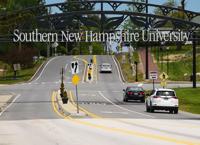Abdul Abdi hopes a four-year degree will be worth it.
The first-year NHTI student is pursuing an English degree, taking classes at the Concord community college while he plots a path to a four-year degree and eventually, he hopes, a life and career that will change the world.


“The dream is to educate and inspire people,” he said.
As wary students across the country question the value of a bachelor’s degree and all the student debt that often comes with it — especially at New Hampshire’s expensive public universities — the state’s community colleges are seeing fewer students like Abdi.
Transfer programs are decidedly less popular as students seek faster returns on their educational investments, said Patrick Tompkins, NHTI’s new president.
“Short-term credentials have become more popular in recent years, because we see students making different choices,” Tompkins said, in response to the pandemic, historically low unemployment and the high cost of a bachelor’s degree.
“Students are questioning the value of a four-year degree,” he said. “What is this four-year degree going to do for me?”
Workforce-focused programs, training future nurses, dental hygienists, welders and electricians are in greater demand from community college students than liberal arts degrees, Tompkins said, with increasing focus on short-term certificates that will let students get to work after just a few months’ study.
But Bureau of Labor Statistics data still show the higher earning power of a four-year degree over a person’s working life. The median bachelor’s degree holder earned almost $70,000 in 2021, the most recent year of data, close to $20,000 more per year than people with a two-year degree.
After graduation from Manchester Central High School in 2020, during the first wave of the pandemic, Abdi said he needed time to figure out his path.
A couple years of working — and a little bit of growing up, he said — refocused him and reignited his love for learning after the disruption of the pandemic. He decided to start at a community college because he worries about student debt, and landed on NHTI because the Concord campus was pretty close to home, and because it offered a meal program.
He found a supportive environment, with professors who encouraged him and other supports to help him succeed in the program as he follows his curiosity.
“I believe colleges should encourage people to do what they want to do, make it a safe space for people to be themselves and find out what they want to do,” Abdi said.
Though NHTI has seen fewer students enrolling with the intent to transfer to a four-year college, the liberal arts offerings remain an important part of the college’s offerings.
Liberal arts offerings are popular with dual-enrollment students — high school students taking courses at community colleges, one of the only areas of growth at community colleges in recent years.
NHTI and other New Hampshire community colleges are also seeing more coordination with four-year colleges looking for students to transfer in, as four-year colleges grapple with dropping enrollment.
Pandemic changed paths
Though a bachelor’s degree is still often seen as a more “prestigious achievement,” Tompkins said, workforce-focused programs such as short-term certificates and industry-recognized credentials have been growing in prominence.
The current scramble for skilled workers means more interest from employers, and students saw the pandemic-proof “essential” fields as more secure career options.
“We see students making different choices,” Tompkins said.
Even for students who might have been on a more “traditional” path to college, the pandemic changed plans.
When COVID-19 hit, Connor Chrusciel was in 11th grade, and lost focus.
“COVID really unmotivated me with school,” he said.
He made up credits his senior year to graduate on time, but higher education was outside his field of vision until he heard a presentation at school about what NHTI had to offer.
Now enrolled at NHTI, Chrusciel is eyeing an exercise-science program at the University of New Hampshire, and is focusing on general education courses to strengthen his application.
Thompson said in Virginia, where he worked before becoming president of NHTI, students transferring from community colleges completed bachelor’s degrees at higher rates and with better grades than students coming straight from high school.
“Those students that are transferring have two years of college under their belts,” he said. “It’s less of a transition than going from high school to a four-year university.”
Debt worries
The cost of a four-year degree has also been a factor in students’ decision-making.
Abdi and Chrusciel said the lower cost of community college credits was a significant factor in their decisions to attend NHTI, and both said they felt more comfortable exploring different paths with less money on the line.
R.J. Dennis is preparing to transfer from NHTI to the University of Massachusetts Lowell in the fall, to pursue a studio art degree in hopes of becoming an arts educator. Avoiding debt as much as possible has been critical, he said.
Dennis spent a few years working after high school and started college at 21. He wanted to be sure he knew what he was doing — because he did not want to waste his time and money.
Even after all that consideration, Dennis ended up changing his major from health science to art.
“The whole experience has been a growing experience,” he said.
Being at a community college has also been good because of relationships he has developed with professors, including a professor who helped steer him toward the art program at UMass Lowell.
Dennis said his path has not been conventional, and it’s becoming even less common. But it was the right one for him.
“I was able to find a college that offers what I want to do,” he said. “It’s a good place to get your foot in the door to start learning things.”
An earlier version of this story misidentified NHTI President Patrick Tompkins.













